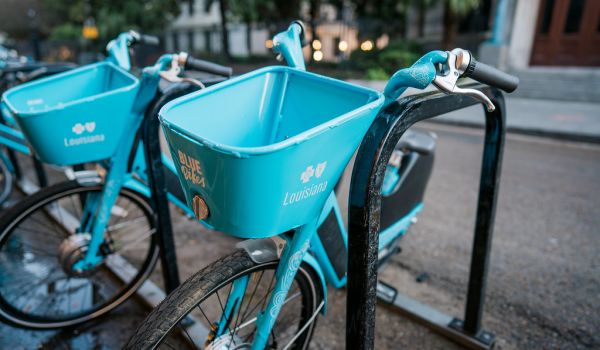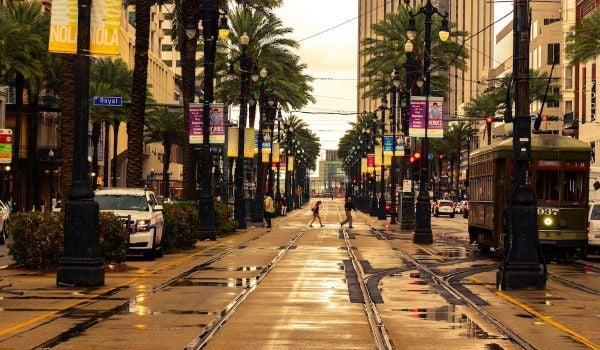In 1960, Moon Landrieu, a young state representative from uptown New Orleans, had a difficult decision to make. The state legislature was about to vote on the future of New Orleans schools and desegregation. Landrieu was no civil rights activist, but had grown to understand the disparities in living conditions between blacks and whites through long conversations with his law school classmate, Norman Francis (the current President of Xavier University). For years, the white establishment had fought the federal government’s Brown v. Board of Education ruling to desegregate the schools. It was in Uptown New Orleans that Norman Rockwell painted Ruby Bridges being escorted into a school by a federal marshal as white protesters tried to intimidate her. When the Catholic schools attempted to integrate a few years later, Democratic machine boss Leander Perez led a movement to force businesses to fire any employee who sent their kids to school with black children. When he was excommunicated, he claimed the church was “being used as a front for clever Jews.” Despite the racist climate, and lack of support from a majority of the white community to integrate the schools, Landrieu voted for school integration — the lone dissenter in a count of 99 to one.
A decade later, Landrieu was voted Mayor of New Orleans by an African-American majority. And almost 35 years after that, New Orleans is still feeling the repercussions of this decision. Mitch Landrieu, the son of Moon, decided to enter the 2010 race at the last moment. As soon as Mitch Landrieu jumped in, the history of the Landrieu name was brought to the forefront, again. Landrieu brings forty years of political baggage to the race, and is hoping that during this time of Saints Fever, blacks and whites will choose the name that is most familiar. While other candidates, like James Perry (Ed. note: the author of this piece previously worked as a consultant to the James Perry campaign) have laid out specific plans for their term, Mitch hopes his family name will help him win the election on February 6th. The only problem, he has tried this twice before, and failed.
In 1994, Mitch, a young state representative, ran for Mayor against Marc Morial (son of the first black Mayor). Morial won, and in 2002, he was succeeded by the CEO of Cox Communications, C. Ray Nagin. Nagin, an African-American, was elected by a white majority that believed he could clean up the contracting process and root out corruption. The business council believed he would run City Hall like a business and his entrepreneurial spirit would allow government to do more with less. Unfortunately, Nagin had run a business that had no competitors, and proved to either not have the will or energy to re-inevent city Hall. He has also faced numerous allegations of siphoning city contracts to his cronies. Immediately after Hurricane Katrina, Nagin commissioned the Urban Land Institute to devise a recovery plan. Hastily trying to meet a deadline, the planners put green dots next to New Orleans East, the Lower Ninth Ward and Broadmoor. Infuriated by the implications that their neighborhood would turn into green space, residents organized to fight the plan. Nagin, worried now that he would now lose African-American support from those neighborhoods, retreated from the plan and made the soon to be infamous comment: “Our city will remain a chocolate city.”
In the spring of 2006, New Orleans was still reeling from the failure of the levees that left eighty percent of the city flooded. Nagin, now fighting for his political life, faced off against Mitch Landrieu in a run-off that split the city further along racial lines, although there was one quite ironic twist. Many conservative whites who detested the Landrieu family because of Moon’s civil rights record would end up voting for Nagin, the black candidate. Nagin, with Jesse Jackson and Al Sharpton at his side, won handily, thanks to overwhelming support from the African-American community.
New Orleans in 2010 is a very different city than when Moon Landrieu was a young state representative. In the late 1960s, New Orleans had almost 700,000 people. By the time school desegregation, the oil crisis and deindustrialization had left their mark, New Orleans only had 450,000 people. This was 2005. In 2010, 330,000 people have returned to a city that still aches from inadequate city services, corruption, and a palpable divide when the political climate intensifies. In November 2009, The Kaiser Family Foundation conducted a survey on race relations in New Orleans. 79% of respondents said that New Orleans is racially and class polarized. Only 14% of white people in the state of Louisiana voted for Obama. A James Carville study last spring showed that only 5% (with a 4% margin of error) of whites in New Orleans believed the term-limited Nagin was doing a good job
This is the historical context in which the 2010 mayoral race is taking place. For the past forty years African-American political machines have dominated city elections, but will they remain powerful, and, if so, who will they throw their weight behind? The city’s African-American population has decreased since Katrina, and many of their addresses for election day get-out-the-vote drives are no longer applicable. With just a few days to go until the general election in which all candidates will compete for the top two spots, New Orleans’ elections can often turn into one of the greatest political shows in this country. For an in-depth look at the day-to-day drama, here are some good places to get acclimated.
#nolamayor ( during daily forums, attendees have been updating the twitterverse with their opinions about each candidate)
Editor’s Note: Next American City does not endorse any candidate for political office.












